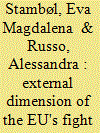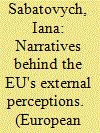|
|
|
Sort Order |
|
|
|
Items / Page
|
|
|
|
|
|
|
| Srl | Item |
| 1 |
ID:
183714


|
|
|
|
|
| Summary/Abstract |
The article constitutes the first comprehensive review of the EU's export of crime control policies and ‘aid to internal security’ across regions over the last 15 years. Drawing on both International Relations and criminology, it develops an analytical framework to identify the political rationalities and technologies of crime control that the EU attempts to transfer across the Eastern and Southern (extended) neighbourhoods. By scrutinising 216 projects aimed at combating transnational crime beyond Europe's borders, spanning law enforcement, border security, criminal justice, and the penitentiary sector, the empirical analysis is geared towards detecting and systematising the ways of thinking and doing crime control that the EU seeks to promote and export. Moreover, it investigates the ‘action at a distance’ whereby it does so. It is argued that in shaping third countries’ ability to criminalise, police, indict, convict, and punish, the EU is simultaneously defining its own security actorness, specifically consolidating its role as a ‘global crime fighter’.
|
|
|
|
|
|
|
|
|
|
|
|
|
|
|
|
| 2 |
ID:
168956


|
|
|
|
|
| Summary/Abstract |
The EU's normative promotion is a keystone in the arch of its Foreign and Security Policy, reflected in establishing a “ring of friends” in its neighbourhood. However, the EU's normative impact in these countries is often hindered by domestic constraints. Conversely, deeper socialisation through persuasion and “learning” may advance towards the promotion of EU norms better. By tracing the “learning” component of the EU's external perceptions in its Eastern (Ukraine) and Southern (Israel and Palestine) neighbourhoods, this paper elaborates upon the receptiveness of EU norms. Considering the specific attention that the ENP draws towards the support of civil society, this paper focuses on “learning” narratives of EU norms among civil society elites in Ukraine, Israel and Palestine as the key targets of EU assistance – with a particular focus on various conceptualisations of learning in the learning process. Notwithstanding perceptions of the EU as a normative power, we find that the learning processes remain too complex to be captured within a single theoretical framework. Whereas communicative rationality implies learning about each other's identities through rational arguing, our analysis demonstrates that identity performance is one of the most emotive and crucial factors in perceptions of learning.
|
|
|
|
|
|
|
|
|
|
|
|
|
|
|
|
| 3 |
ID:
103744


|
|
|
|
|
| Publication |
2011.
|
| Summary/Abstract |
One of the aims of this article it to clarify the nature of the debate over 'civil society' and its relationship to the state. It begins by suggesting that the EU's borderland provides a context in which deep-rooted 'Western' and 'Eastern' understandings of state and civil society meet and overlap. The second section outlines the geo-political reshaping of the 'Neighbourhood'. It concentrates on the influence of non-EU actors, notably Russia, complementing the EU-focused literature on the subject. The third section elaborates the consensus in the literature on the weakness of civil society in the EU 'Neighbourhood'. This is followed by a discussion of 'Western' debates over the role and significance of civil society. This discussion suggests that the 'export' of a Western model eastwards begs many questions about which particular model is to be promoted. It concludes that the precise characteristics of state-civil society relationship remains central to the prospects for enhancing civil society co-operation.
|
|
|
|
|
|
|
|
|
|
|
|
|
|
|
|
|
|
|
|
|